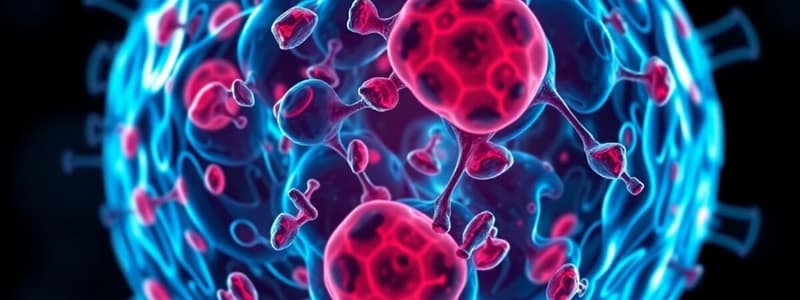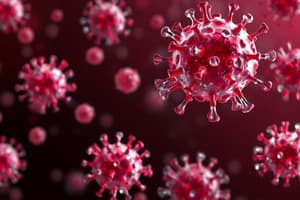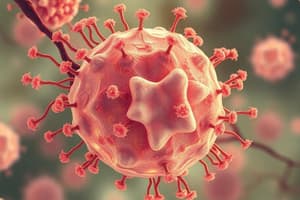Podcast
Questions and Answers
What role do lymph node macrophages play in the immune response?
What role do lymph node macrophages play in the immune response?
- They primarily target viruses and large antigens for ingestion. (correct)
- They process and present free antigens to T-cells.
- They assist T-cells in locating DC cells in the lymph nodes.
- They activate soluble antigens for B-cell recognition.
What is the initial fate of B-cells when they recognize an antigen in the lymph node?
What is the initial fate of B-cells when they recognize an antigen in the lymph node?
- They stay in the lymph node until Th cells activate them. (correct)
- They die without proliferation.
- They migrate to the spleen immediately.
- They initiate apoptosis right away.
What occurs within 48 hours after a B-cell binds with an antigen?
What occurs within 48 hours after a B-cell binds with an antigen?
- The B-cell is activated and produces plasma cells. (correct)
- The B-cell undergoes apoptosis.
- The B-cell exclusively produces IgM antibodies.
- The B-cell forms a memory cell.
Which of the following statements concerning T-cell activation is true?
Which of the following statements concerning T-cell activation is true?
What is the primary function of the IgD antibody in B-cell activation?
What is the primary function of the IgD antibody in B-cell activation?
What is the primary role of cytotoxic T cells (CD8/Tc cells)?
What is the primary role of cytotoxic T cells (CD8/Tc cells)?
Which molecule is essential for T-cells to recognize antigens?
Which molecule is essential for T-cells to recognize antigens?
What happens during the clonal expansion of T cells upon activation?
What happens during the clonal expansion of T cells upon activation?
Which type of T cell is primarily responsible for activating B-cells?
Which type of T cell is primarily responsible for activating B-cells?
What is the major consequence of HIV targeting CD4 T cells?
What is the major consequence of HIV targeting CD4 T cells?
How are microbial antigens presented on MHC class II molecules?
How are microbial antigens presented on MHC class II molecules?
Which cytokines do helper T cells primarily release to assist in immune activation?
Which cytokines do helper T cells primarily release to assist in immune activation?
What is a key feature of the T-cell receptor (TCR)?
What is a key feature of the T-cell receptor (TCR)?
Flashcards
T cells and B cells activation
T cells and B cells activation
Immune cells that recognize antigens and become activated in lymph nodes.
B-cell activation process
B-cell activation process
B-cells stay in lymph nodes, process antigens, and bind with IgD to prepare for activation.
Clonal selection of T-cells
Clonal selection of T-cells
T-cells proliferate into cytotoxic (Tc) and helper (Th) cells after detecting an antigen.
Plasma cell production by B-cells
Plasma cell production by B-cells
Signup and view all the flashcards
Classes of antibodies produced
Classes of antibodies produced
Signup and view all the flashcards
T-cells
T-cells
Signup and view all the flashcards
Cytotoxic T cells
Cytotoxic T cells
Signup and view all the flashcards
Helper T cells
Helper T cells
Signup and view all the flashcards
MHC I
MHC I
Signup and view all the flashcards
MHC II
MHC II
Signup and view all the flashcards
Clonal expansion
Clonal expansion
Signup and view all the flashcards
Activation of B cells
Activation of B cells
Signup and view all the flashcards
Antigen presentation
Antigen presentation
Signup and view all the flashcards
Study Notes
T-Cell Activation
- T-cells mature in the thymus.
- Each T-cell has a unique T-cell receptor (TCR) that recognizes specific antigens.
- T-cells recognize antigens presented on the surface of infected cells.
- Effective against viruses and intracellular pathogens.
- Types:
- Cytotoxic T cells (CD8/Tc cells): Kill cancerous or infected cells.
- Helper T cells (CD4/Th cells): Activate the immune system via cytokines.
- T-cells recognize infected cells via antigens presented on MHC molecules (major histocompatibility complex).
- MHC Class I (MHC I): Found on all nucleated cells in the body. Presents foreign proteins.
- Foreign proteins digested by proteasomes.
- Foreign peptides delivered to MHC I via the endoplasmic reticulum (ER).
- Recognized by cytotoxic T cells (Tc cells), leading to cell death.
- Mechanism:
- Infected cell presents antigen on MHC I.
- Tc cell recognizes the antigen via its TCR.
- Tc cell kills the infected cell using granzymes and perforin.
- MHC Class II (MHC II): Found on dendritic cells and macrophages. Involved in surveillance and triggering immune responses.
- Microbes digested within phagosomes.
- Microbial peptides loaded onto MHC II and presented on the cell surface.
- Recognized by helper T cells (Th cells), which secrete cytokines to activate antigen-presenting cells (APCs).
- Mechanism:
- Dendritic cells (DCs) present antigen on MHC II in lymph nodes.
- Th cells are activated.
- Th cells release cytokines to activate immune cells.
Antigen Presentation (Summary)
- Infection occurs.
- DCs present antigens to T-cells in lymph nodes.
- T-cells are activated and released.
- Tc cells kill infected cells.
- Th cells activate DCs/macrophages presenting the antigen.
- Memory T-cells are produced.
Clonal Expansion of T-cells
- Activated by dendritic cell proliferation (1-2 days).
- Effector cells (Th CD4 and Tc CD8) leave lymphoid tissue.
- Importance of Th cells:
- Allow B-cells to become plasma and memory cells.
- Stimulate Tc cells to proliferate and kill infected cells (e.g., IFN-γ and TNF-α).
- Activate macrophages to kill pathogens.
- HIV targets CD4 cells: Compromises the immune system.
B-Cell and T-Cell Activation
- Naive T-cells and B-cells migrate to lymph nodes/spleen after maturation.
- Continue circulating in the body.
- Upon infection:
- Microbes enter.
- Antigens presented in lymph nodes (by DCs).
- Free antigens enter the blood (spleen).
- T-cells and B-cells recognize and become activated.
Antigen Entering Lymph Nodes
- B-cells: Look for free antigens in lymph nodes.
- Lymph node macrophages: viruses and large antigens.
- Lymph fluid: soluble (small) antigens.
- T-cells: Look for DCs presenting antigens.
- Scan all DCs within 24 hours.
- If no antigen, move to next lymph node.
- If antigen detected, T-cell clones are activated.
- If soluble antigen detected, B-cells wait for Th cell activation.
B-Cell Activation
-
If antigen detected, B-cell stays in lymph node.
-
T-cells proliferate into Tc and Th cells (clonal selection).
-
B-cell's IgD binds antigen, engulfs it, processes it, and presents it via MHC II.
-
Within 48 hours, B-cell finds a Th cell with the correct TCR.
-
B-cell is activated, differentiating into plasma cells.
-
B-cell activation and proliferation take 4-7 days in lymph nodes, producing ~5000 plasma cells.
-
Plasma cells produce 5 classes of antibodies (GAMED).
Studying That Suits You
Use AI to generate personalized quizzes and flashcards to suit your learning preferences.




